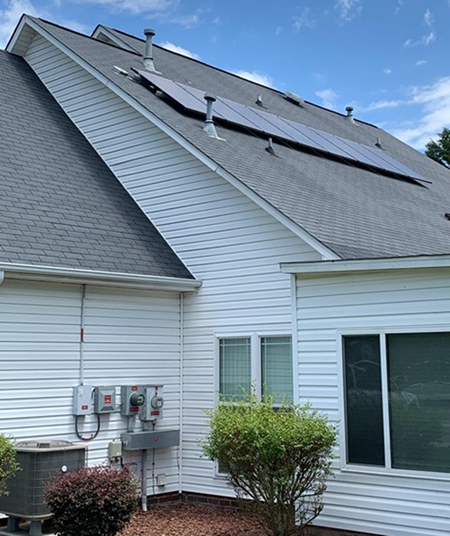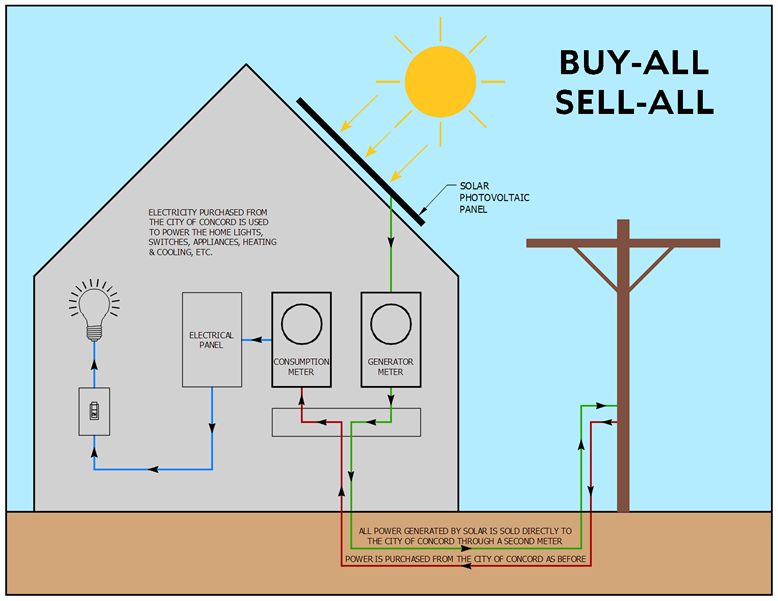ATTENTION! – A PRE-PROJECT APPROVAL MEETING, WITH THE CITY OF CONCORD, MUST BE COMPLETED BEFORE ANY PAPER WORK IS SUBMITTED.
 The Electric Systems Department supports innovative ways to use and conserve energy sources that protects our environment. Renewable energy resources, such as wind and solar energy, are playing an increasingly important role in meeting the nation’s energy needs. Today, there are many renewable technologies that are commercially available to homeowners and businesses that can be safely interconnected to our electrical grid. These resources are important to Electric Systems Department balanced approach to meeting our region’s growing electrical needs and helping to establish a cleaner energy future.
The Electric Systems Department supports innovative ways to use and conserve energy sources that protects our environment. Renewable energy resources, such as wind and solar energy, are playing an increasingly important role in meeting the nation’s energy needs. Today, there are many renewable technologies that are commercially available to homeowners and businesses that can be safely interconnected to our electrical grid. These resources are important to Electric Systems Department balanced approach to meeting our region’s growing electrical needs and helping to establish a cleaner energy future.
What is Buy-all Sell-all?
Buy-all sell-all is a way for small scale renewable energy producers to connect back into the grid. This typically uses a two-meter setup. One-meter measures what customers are consuming and the other measures what they are producing. It is pretty simple really. Please contact the City of Concord Electric Systems Department to schedule a pre-project meeting. A Pre-Project meeting must be completed before any paper work is filled out and submitted so we can review our requirements and policies with you. Our policies may impact the economics of your installation.
The City of Concord offers a Buy-All, Sell-All Compensation Program for new distributed generation customers, where a customer's total system production and total household consumption are credited and billed at separate rates. The participating customer-generator's monthly bill reflects the difference between these two components. In contrast to net metering or net billing programs, customers participating in Concord's buy-all, sell-all program do not receive a retail rate credit for energy consumed directly on-site, behind the meter.
How does it work?
As stated, in a buy-all sell-all arrangement two meters are typically employed. Normally when we think about renewable energy, we think about solar panels on someone’s roof. This is accurate but often times customers think that as soon as they put the solar panels on the roof their power bill will go down. While this can be the case in a net metering arrangement it is not the case in a buy-all sell-all arrangement.
Surprising to some is that in a typical buy-all sell-all arrangement the normal electric bill does not change. This may be confusing. But what we are saying by buy-all sell-all is that we are going to buy all of the power that we use from the power company as usual. Then, all of the power that our solar panels or wind turbines produce will be sold back to the utility.
For the power produced the customer will be credited at an avoided cost. This is paid at a predetermined rate set by the utility. Normally it is close to the wholesale rate they pay. For example, if you pay $0.091 per kWh, the utility may pay you $0.035 per kWh. This means that you are not getting the retail rate paid back to you.

An improperly installed system has the potential to seriously injure an Electric Systems Department employee who may be working on our electric lines.
Failure to contact the Electric Systems Department ahead of time can result in the Electric Systems Department requiring that you disconnect your solar panel and isolate it from our electrical system.
Small Generating Facility Process
Interconnection References for Generating Facilities 20 kW or less for residential customers and 100 kW or less for non-residential customers
Large Generating Facility Process
Interconnection References for Generating Facilities larger than 20 kW residential or larger 100 kW non-residential customers
General Notes for All Systems
The Electric Systems Department reserves the right to require further study, including but not limited to system feasibility and system impact. The cost of these studies and any subsequent utility system upgrades will be the responsibility of the renewable generation owner.
The system owner will be responsible for all work and associated equipment purchases. Typical expenses will include a second meter, permit costs, and any work related to utility system interconnection. Interconnection Agreements should be executed before construction begins.
For more information
Contact: Jon Cruse, 704-920-5312 or Fred Porter, 704-920-5303
Renewable Energy Coordinator
PO Box 308
Concord, NC 28026-0308